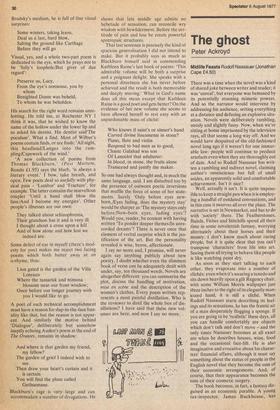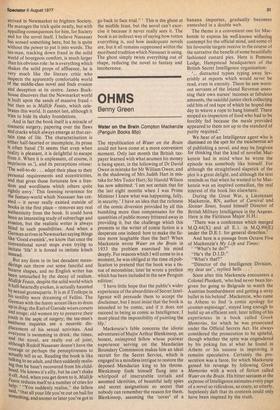The ghost
Peter Ackroyd
Midlife Feasts Rudolf Nassauer (Jonathan Cape £4.50)
There was a time when the novel was a'kind of shared joke between writer and reader; it was 'unreal', but everyone was bemused by • its potentially stunning mimetic powers. And so the narrator would intervene by addressing his audience, setting everything at a distance and defusing an explosive situation. Novels were deliberately rambling, untidy and slightly fussy. Now, when we're sitting at home imprisoned by the televisiOn rays, all that seems a long way off. And we would have despaired of the old-fashioned novel long ago if it weren't for one immutable law: people will continue to produce artefacts even when they are thoroughly out of date. And so Rudolf Nassauer has written a rambling and indirect novel, claiming author's omniscience but full of small asides, an apparently solid and cOnafortable achievement. Isn't it nice?
Well, actually it isn't. It is quite impossible to keep a straight pen when it-is employing a handful of outdated conventions, and in this case it swerves all over the place. The narrative is set in Newmarket, and has to do with 'society' there. The Featherstones, Bairds, Fishes and Stitchills spend all their time in some novelettish fantasy, worrying alternately about their horses and their money. I don't know much about racing people, but it is quite clear that you can't transpose 'characters' from life into art. Seeing them all trying to behave like people is like watching paint dry.
As soon as they start talking to each other, they evaporate into a number of clichés: even when it's wearing a tuxedo and sits down heavily upon a gilt Regency chair, with some William Morris wallpaper just three inches to the right of its elegantly manicured hand, it is still a cliché. When Rudolf Nassauer starts describing its feelings and its sensations, he has the frantic air of a man desperately flogging a sponge. If you are going to be 'realistic' these days, all you can handle comfortably are objects which don't talk and don't move — and the only times Nassauer becomes at all exact are when he describes houses, wine, food and the occasional face-lift. He is also imaginative and evocative about his characters' financial affairs, although it must say something about the status of people in the English novel that they become the sum of their economic arrangements. And, of course, that their appearance becomes the sum of their cosmetic surgery.
The book becomes, in fact, a fantasy disguised as an economic parable. A young tax-inspector, James Buck house, has arrived in Newmarket to frighten Society. He manages the trick quite neatly, but with appalling consequences for him, for Society and for the novel itself. I believe Nassauer has sensed something here, but he is quite Without the power to put it into words. The tax-man, tracking down fraud in the solid World of bourgeois comfort, is much larger than his obvious role: he is everything which shakes the solid props of affluence, he is very much like the literary critic who inspects the apparently comfortable world of the middle-class novel and finds evasion and deception at its centre. James Buckhouse discovers that the Newmarket world IS built upon the sands of massive fraud — but then so is Midlife Feasts, which celebrates this world. It cannot last, although it tries to hide its shaky foundations.
And in fact the book itself is a miracle of Cosmetic surgery; papering over the flaws and cracks which always emerge at that certain time of life. The characterisation is either half-hearted or incomplete, its prose LS, often banal (`It seems that even when reality is pleasant, it is delightful to escape from it. When it is unpleasant, of course, it ilnprisons us.'), and its perceptions otiose: The well-to-do . . adapt their place to their Personal requirements and eccentricities, and that gives those fortunate few a freedom and wordliness which others quite rightly envy.' This fawning reverence for the fantasy-world which Nassauer has created — it never really existed outside of books in the first place — removes any real authenticity from the book. It could have been an interesting study of subterfuge and evasion, but the realistic writer is always blind to such possibilities. And when a German arrives in Newmarket saying things like 'Good evenink', we know that once the conventional novel stops even trying to imitate 'life' it is forced to imitate kitsch instead.
But any form in its last decadent meanderings can throw out some fanciful and bizarre shapes, and no English writer has been untouched by the decay of realism. Midlife Feasts, despite the solid world which ,it half-heartedly evokes, is actually haunted °Y sexual grotesquerie. It is as if Trollope in his senility were dreaming of Fellini. The German with the funny accent likes to dress ulp in drag; the Earl of Garside wears corsets and rouge; old women try to preserve their Youth in the aspic of surgery; the tax-man's assiduous inquiries are a neurotic dis • placernent of his sexual activities. And everyone is swimming in drink; the times, and the novel, are really out of joint, although Rudolf Nassauer doesn't have the Courage or perhaps the perceptiveness to actually tell us so. Reading the book is like talking to an adult, and then suddenly realising that he hasn't recovered from his childhood. He knows it's silly, but he can't shake It off. And, when you get down to it, Midlife feasts reduces itself to a number of cries for neIP: ' "You suddenly realise," the fellow said, "that all your life you're out on bail for sQnlething, and sooner or later you've got to go back to face trial." ' This is the ghost at the midlife feast, but the novel can't exorcise it because it never really sees it. The book is an indirect way of saying how rotten ev,erything is, and how inadequate novels are, but it all remains suppressed within the moribund tradition which Nassauer is using. The ghost simply twists everything out of shape, reducing the novel to fantasy and incoherence.











































 Previous page
Previous page